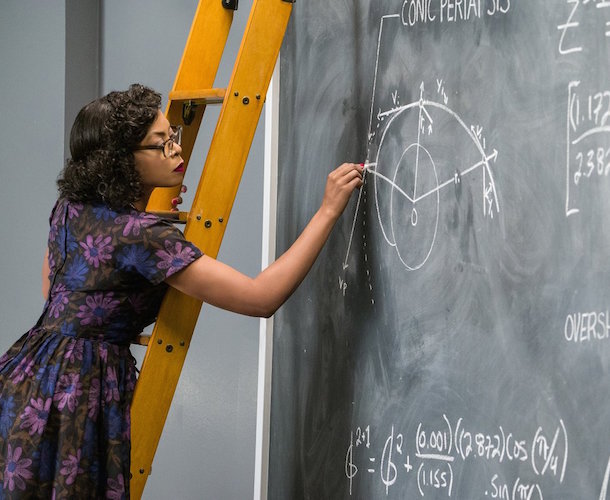Film Review: “Hidden Figures” — Finger Painting by the Numbers
All of these stories are powerful… if only they were treated with dramatic complexity rather than as fodder for simple-minded inspiration.
Hidden Figures directed by Theodore Melfi. In screens around New England.

A scene from the film “Hidden Figures.”
By Paul Dervis
Films with a comic book theme are all the rage. I’m sure Marvel Comics is making a fortune. Give the kids what they want, right? And the after-market for action figures must be huge. Stick something from X-Men in a happy meal and sell millions of fatty burgers.
Hidden Figures is not actually a film based on a comic book hero, but it might as well have been. Though, to be accurate, this film would be most accurately described as Classics Illustrated brings us Civil Rights and Feminism…except, if that were true, the filmmakers would have done a better job. Classics Illustrated could be pretty damn good on occasion.
We are informed early on that the film is based on a true story (Margot Lee Shetterly’s book of the same name), a pledge of fidelity coming from a Hollywood that, for years, exploited the notion of ‘alternative facts’ well before the Trump administration. (Everyone is picking up Orwell’s 1984, but Trump is pure creature of showbiz.) In other words, keep in mind that ‘any resemblance between the characters in this movie and real people is purely coincidental.’
The embrace of hokum is a shame, because with some real depth in the characterizations, some genuine kick in the conflicts raised, some restraint with the heart-plucking soundtrack, this might have been a compelling film.
Katherine Johnson (Taraji P. Henson), Dorothy Vaughan (Octavia Spencer), and Mary Jackson (Janelle Monae) are fast friends. They are also African American women working in NASA’s Virginia compound in 1961. Oh, and they are all brainiacs.
We see early on, when their car breaks down on the way to work and a State Trooper with an attitude pulls up, that they are chronically hassled by The Man. I have no doubt that this kind of thing happened, but it is the by-the-numbers treatment that makes me pause. This is also a tip-off that the trio will be facing discrimination in virtually every scene. Given what is happening in America today, with police shootings of innocent minorities and institutionalized practice of bigotry, it is understandable that the film would expose the underbelly of our past and present. But the depiction of prejudice is dramatized in such a cardboard way here, in so ham-fisted a way, that it actually manages to be unmoving…and that is hard to pull off.
Cutting to the chase, Johnson is a math wiz and she is taken out of the “coloured pool’ to help the white, male Ph.D’s figure out how to send John Glenn into space and safely bring him back. She is given the cold shoulder from all her peers; she has to walk a mile to use the only ladies room ‘colors’ have permission to use. But she is smarter than the rest of the team and becomes a pivotal figure in saving the astronaut’s life.
Meanwhile, an IBM computer is about to put the black women number crunchers out of work, so Vaughan (their unofficial leader) steals a book from the white section of the library. She proceeds to learn Fortran better than anyone else at NASA and saves everyone’s jobs. And Jackson, a brilliant mind who has been denied an Engineering degree (it was only available to whites where she grew up), manages to get into a program.
All of these stories are powerful… if only they were treated with dramatic complexity rather than as fodder for simple-minded inspiration.
None of the three leads do much with their roles. Henson, who has a ton of tv credits, spends most of the film looking hurt and awkward. She is cast as the lead, but she has trouble carrying the film. Spencer’s Vaughan (The Help) is more effective. Her character is a balance of brashness and restraint, and she puts the figure’s plight as an under-appreciated worker across quite well. But the script doesn’t give her enough to work with. It is Monae’s performance that comes closest to suggesting what might have been with a proper respect for the material: her character’s combination of intelligence and street smarts is impressive.
The supporting roles were just awful. Kevin Costner stinks in the role of Johnson’s boss — it is about time he looks for another career. Kristen Dunst portrays Vaughan’s supervisor in one-note fashion: she is pure unadulterated Ice Queen. Oh, and Jim Parsons of Big Bang Theory fame, playing Johnson’s colleague and desk mate with a chip on his shoulder, phones in his performance.
Director Theodore Melfi, who also co-wrote the script, only has himself to blame for this insipid effort. In 2014 he released a film he wrote and directed, St. Vincent, an introspective look at people living on the edge. It was gutsy and funny and had flickers of significance. What happened?
Paul Dervis has been teaching drama in Canada at Algonquin College as well as the theatre conservatory Ottawa School of Speech & Drama for the past 15 years. Previously he ran theatre companies in Boston, New York, and Montreal. He has directed over 150 stage productions, receiving two dozen awards for his work. Paul has also directed six films, the most recent being 2011’s The Righteous Tithe

